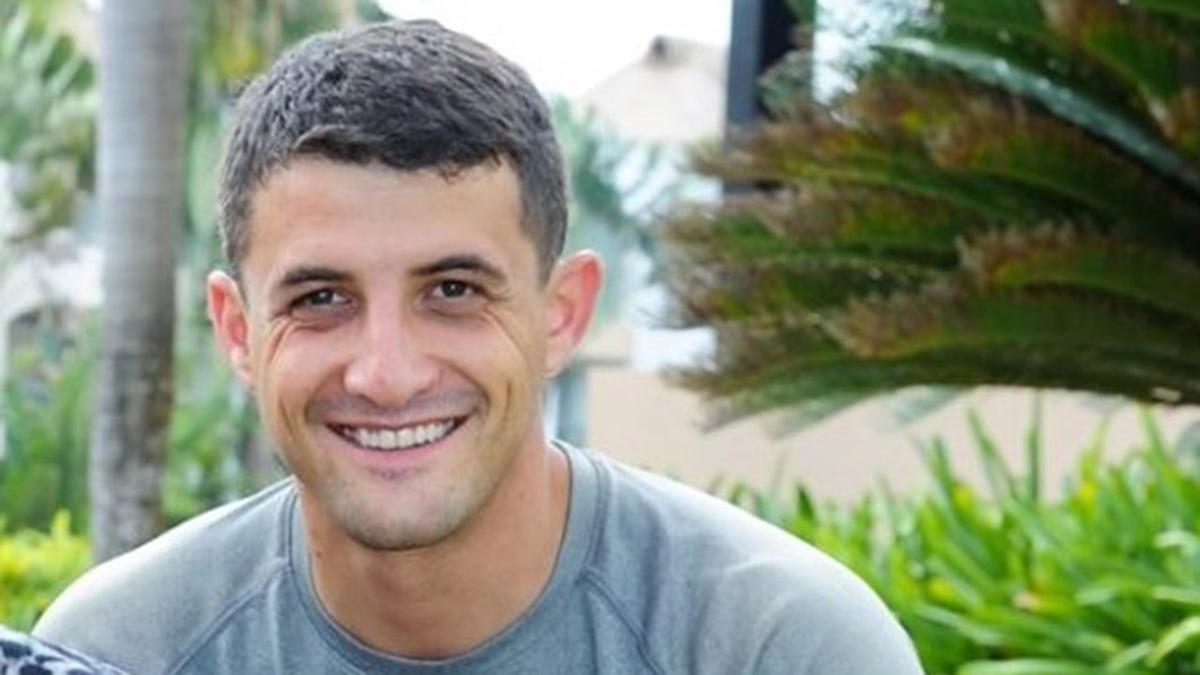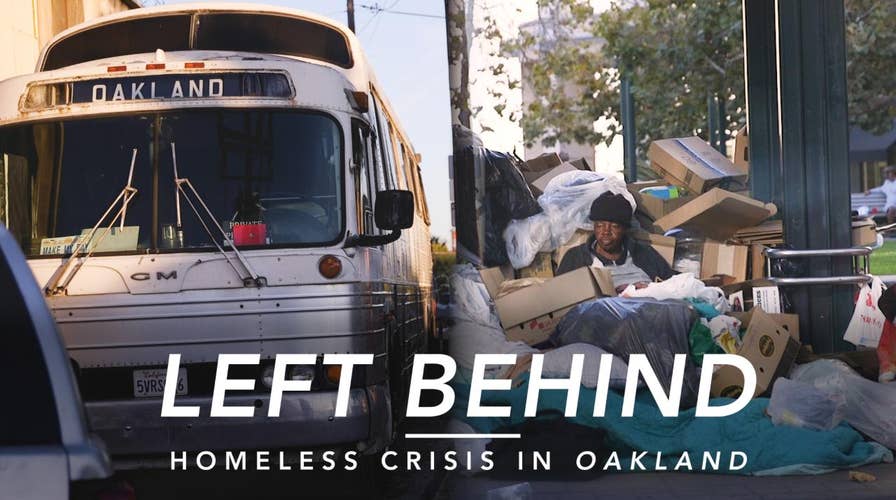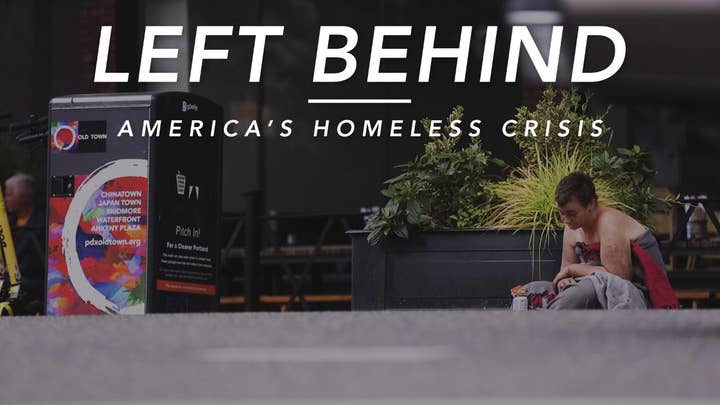Left Behind: Homeless Crisis in Oakland
Fox News embarked on an ambitious project to chronicle the toll progressive policies have had on the homeless crisis in five west coast cities: Seattle, San Francisco, Los Angeles, Oakland, and Portland, Ore. In each city, we saw a lack of safety, sanitation, and civility. Residents, the homeless and advocates say they've lost faith in their elected officials' ability to solve the issue. Most of the cities have thrown hundreds of millions of dollars at the problem only to watch it get worse. This is what we saw in Oakland.
This is the latest report in an ongoing series by Fox News on the severe homelessness crisis West Coast cities are enduring due to rampant drug addiction, skyrocketing housing prices, mental illness and, in many cases, misguided governmental policies.
OAKLAND, Calif. — Freddie lives in a hole in Oakland. The middle-aged, longtime heroin addict has no running water, electricity or a bathroom. He does have six pigeons and a feral cat that keep guard over his belongings and hiss at strangers who get too close. He sleeps on a bed of trash and his open-air home is a hodgepodge of reminders that Freddie is not OK. He spends most days cleaning up the sidewalk opposite his home. On days when the drugs really kick in, he can be seen sweeping dirt from one side of a dirt lot to the other.
There are a lot of Freddies in Oakland — people who are down on their luck or pushed out of their homes and struggling with mental illness who find it easier to turn to drugs than face reality.
TEXAS GOV. ABBOTT OPENS HOMELESS CAMPSITE ON STATE LAND IN FIGHT WITH AUSTIN
Oakland has seen a 47 percent jump in homelessness — one of the largest surges of any California city, according to a one-night street count released in July. The count, which used federal guidelines, showed Oakland had 4,071 homeless people in 2019, up from 2,761 in 2017. The increase puts the city's per capita homeless rate higher than neighboring San Francisco and Berkeley and comes at a time when several West Coast cities are struggling with a homeless crisis that's being driven by rising rents, drug addiction, mental illness and pushback from progressives.
The Point-In-Time Count also found that the number of people living in their vehicles had more than doubled, skyrocketing 131 percent. At the beginning of the year, there were 1,430 people living in their vehicles, up from 618 in 2017. Roughly half called their cars and vans home while the others sought shelter in recreational vehicles.
The increase in homelessness didn't come as a surprise to city officials, residents or business owners who have watched Oakland deteriorate over the past five years. It's led to unconventional suggestions by fed-up residents like Oakland property dealer Gene Gorelik, who said the homeless should be put on a party bus stocked with alcohol, driven over the border and stranded in Mexico. In July, Gorelik attempted to shoot $1,000 in dollar bills over a homeless camp. He wanted to bribe the homeless to leave. Community activists shouted him down before he could turn his cash-filled leafblower on.

Gorelik has extreme views on how to manage the homeless population.
Though Gorelik's stunts are extreme, Oakland has been struggling to balance the needs of its residents while keeping its compassion toward those in need. The problem is, it isn't going very well.
Oakland City Councilman Noel Gallo told Fox News that elected officials are often too consumed with their public image and are "too loose and flexible" with the laws in place making it difficult to reverse Oakland's sobering statistics. When the city has tried to get tough and remove the homeless or dismantle camps, they have been slapped with lawsuits from advocates that argue kicking the homeless out is a civil rights violation.
"We are in court regularly – in federal court – based on the 14th Amendment, the Eighth Amendment, the Fourth Amendment that everyone has rights but, at the same time, I as a resident, also have constitutional rights and that's where the debate is currently," Gallo said, adding that even though the city has won all of its court challenges to date, the cases have taken up a lot of time, patience and money.
Gallo also believes Oakland is bearing the brunt of a regional crisis because some cities like San Francisco are busing their homeless to Oakland and abandoning them.
Oakland's soaring homeless rate is also affecting the way retail stores conduct business and has already driven several out of the area, Gallo said.
Small business owner Mika McCants thought she was making a smart decision when she moved her shop, Spoiled Boutique, to the Frank Ogawa Plaza near Oakland's City Hall two years ago. She experienced problems almost immediately.
"I am exposed to what I call the 'Thriller' video after hours," she told Fox News, saying homeless men, some of whom suffer from mental illness and drug addiction, gather outside her store regularly.
"I am exposed to what I call the 'Thriller' video after hours. The zombies - I know that's an awful term to use - but what I mean is that, the freaks come out at night."
"The zombies – I know that's an awful term to use – but what I mean is, the freaks come out at night," she said.
NEW VEGAS LAW CRIMINALIZES HOMELESS SLEEPING ON DOWNTOWN STREETS IF SHELTER BEDS AVAILABLE
McCants said she's frustrated by the harassment her customers have had to endure, but the fact that it is happening just steps from City Hall is like putting salt on a wound.
"There is quite a bit of drug activity that is in downtown Oakland, right here in front of the mayor's office, right under their noses," she said.
McCants has filmed several incidents, including one in which a man stood outside her store in a near-comatose state for 32 minutes. "He was asleep standing up," she said. "This has happened quite a few times."
McCants said she's called the authorities multiple times and has asked what she should do in a situation where she fears for her safety. She said she was told that if she wasn't in immediate physical danger, there wasn't much the cops could do.
"'Their answer to that is nine times out of 10, 'If you call us and they are not harming you or your business, we are not going to come out. You can file a report online or you just need to attend the city council meeting and express it there,'" she said.
The incidents, though, have been growing in intensity.
A homeless man "clearly suffering with some mental health issues" recently stood outside McCants' door.
"(He) started pulling down the tree branches wildly right in front of the door, to where my customer was afraid to walk out the door... but again, if he's not physically attempting to harm me or the customer or break a window in the store, they won't come help," she said.

A homeless woman sits at a bus stop in Oakland, surrounded by her belongings. (Credit: Gabe Nazario/Fox News)
Monica Chavez, the manager at a chocolate shop near City Hall, told Fox News she saw a homeless man walking up to strangers and shaking them by the shoulders. The native Oaklander thinks visitors to the city "would not feel safe around here."
Though McCants and Chavez believe Oakland is putting the needs of the homeless before its tax-paying residents, they are even more frustrated that there hasn't been a comprehensive strategy in place to deal with the problem and complained the city is too focused on temporary solutions.
"Yes, I am affected as a business owner but no, I don't particularly like it or care to see it or have my customers afraid because of what's going on directly outside my business. But these people need help as well," McCants said.
Oakland, which has budgeted $87.4 million for homeless services and affordable housing over the next two years, has tried. The city is committed to building thousands of affordable homes by 2024. It's also pushed "cabin communities," city-sanctioned encampments and safe RV parking sites with varying degrees of success.
BEN CARSON: PROBLEMS WITH HOMELESSNESS CAN ONLY BE FIXE WITH EVIDENCE-BASED POLICIES
Oakland's "community cabins" are small shedlike structures with a single cot, blanket and window that not only give the homeless a place to sleep but also grants them access to health care and links them up with a case manager. Though the city's social experiment is 100 percent voluntary, residents are required to sign a six-month contract to stay, but then they are on their own.
Since the program began two years ago, Oakland's homeless were given the choice to move into a community cabin or move on when their camp was being dismantled. So far, 329 people have moved through the cabin program. Of those, 209 found permanent housing while 120 others found themselves back on the streets. While ambitious, the community cabins have had mixed reviews.

A row of homeless tents in Oakland, Calif. (Credit: Gabe Nazario/Fox News)
"It's a band-aid on a huge wound," Candice Elder, founder of the East Oakland Collective, a non-profit that helps the homeless, told KPIX 5. "The city calls them community cabins, but they are Tuff Sheds. They are backyard tool sheds that people don't belong in. You're supposed to put your leaf blower, your chain saw, your tools in, not people."
Elder, like many homeless advocates Fox News spoke to, believes better options are available.
"Like container homes and tiny homes," she said. "Let's maybe even look at model tent communities where it's more structured, self-governed and where you can actually put resources like sanitation where you have wrap-around services and meet people where they are."
There have also been concerns raised about the case managers in the community cabin program.
District 2 Councilmember Nikki Fortunato-Bas said she met two homeless people who had timed-out of the six-month program and that they told her they weren't in regular contact with their case manager.
Another problem facing Oakland is that many people living on the street have grown suspicious of government-run programs and are less likely to accept shelter.
When Oakland offered Wood Street homeless residents a chance to move to a community cabin, 63-year-old Ardis Hayes told The New York Times that he'd rather be outdoors and likened the cabins to "a mini concentration camp."
Elizabeth Easton told Fox News she "would not go quietly" if forced by the city to move out of a cramped encampment surrounding the Home Depot in Fruitvale. Easton moved to Oakland in the 1990s but left for Texas in 2011 after an incident with authorities. Hurricane Harvey demolished her Beaumont home in 2017 and she eventually made it back to California where her children and grandchildren live.
"I can't stay in no apartment. I've been traumatized. It would never work for me. I will always refuse it."
"I can't stay in no apartment. I've been traumatized. It would never work for me. I will always refuse it," she said.
In early November, Oakland city crews pulled 250 tons of trash and debris out of the Fruitvale Home Depot encampment and Gallo, whose district includes the camp area, said there's about 50 more tons to go.
"It'll blow your mind," Gallo told Fox News before showing us around the site where an estimated 80 people live.
In a recent interview, Oakland Mayor Libby Schaff told KQED News that the city is "trying to resolve that encampment in a way that's effective and compassionate and that is the tightrope that I as mayor have to walk every day."
CLICK HERE FOR THE FOX NEWS APP
It is unclear just how long Oakland's tolerant policies toward the homeless will last. In the past few months, there have been a number of fires started at camps. In fact, between Jan. 1 and Oct. 1, there were 158 confirmed fires related to homeless camps that were reported to the authorities.
"It's a real problem," Gallo said. "People are lighting each other's stuff on fire."











































